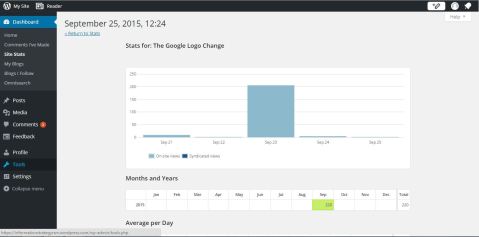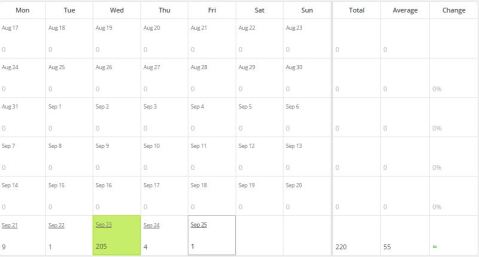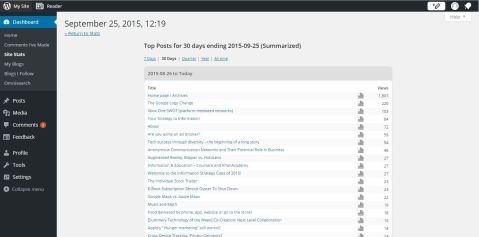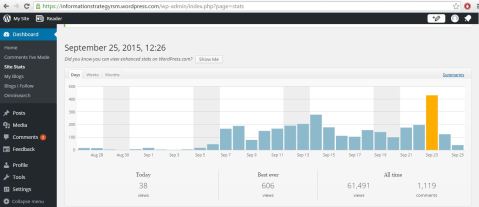Sorry; I’ve been cheating on you, but it worked!

Like most of you guys, I have posted my first blogpost (The Google Logo Change) last week (21-09). Since I have never blogged before, I was looking at my own work approximately every 10 minutes, hoping for any kudos. I thought: ‘maybe they are only reading, commenting and rating on WordPress in the evening’ or ‘they will probably look at it tomorrow, I better check the comments then so I can answer any questions’. Nothing happened. Even ‘gabriellapimpao’, our top commenter, left my blog to die in the constant stream of new blog posts.
As you see, these are not the numbers you get excited from when you passionately write a blog for the first time. Desperately and not knowing what to do with my life anymore, I decided to take the matter into my own hands. Again, my inexperience with blogging couldn’t prevent me from doing something stupid. This was the result:
On September 23rd my view count was 205, where the average was 15-20 views for other blogs. My blog was even more clicked on than the home page button. Also the general views, with at its highest 278 views, spiked to 430 on the 23rd. Naturally, this isn’t caused by a sudden interest in my blog, but from a cheat.
As an experiment, I started to examine a web automation tool. This tool enables the user to automate nearly any Internet-action you can think of. Building a loop for my tool was very easy. Unintentionally, I didn’t pay enough attention and left it running, after I tested it successfully. Resulting in the numbers stated above. But this got me thinking. With such tools, any cheat is possible and these cheats could be very valuable. I am personally thinking of generating likes for Facebook posts or pages and inviting as many people as possible on LinkedIn. When you Google on increasing likes for Facebook, you get 2 pages with sites about buying them. Since they exist I am sure they are used; with a web automation tool you can reduce costs. I dare to say that automation tools are already used on LinkedIn by Linked In Open Networkers or LIONs. These people invite as many others as possible to create bridges for networks. After some playing with the software, I was able to create the script for it myself. The tool automatically browses to a profile, clicks on the ‘connect’ button, chooses the right option from the drop downs and types a text. Finally, it is also sends the request automatically.
I am wondering what you guys think these tools could be used for. Besides that I am also curious about your general opinion of using these tools.
With the existence of these tools, I am doubting the Internet even more if it comes to it being ‘personal’. For business sake, I fully understand the usage of the tools but it is and will always be cheating.
Oh, and for the record. I purposely left out the name of the tool since I don’t trust you bastards ;). For the sake of honest competition for most popular blog, I will not boost my views of this blog. If you wonder how far the tool could get our views-rate, let me know and I will turn on the machine again :).
Juliën Mets
357789jm







Wow. That’s one concrete blog. I have to say that these web automation tools also exist on Instagram. Given that I have had previous experience in the field, I’ve decided to analyse what could generate more engagements in social media platforms, or generate traffic. These so called “cheats” indeed seem to work. Obviously, it’s not necessarily 100% organic, but it is not entirely fake as I have discovered for IG. It helps to put yourself under the spotlight for others to see you, leading to a growth in organic viewers after all.
In other words, your most viewed blog was not mostly seen by us, but by outsider viewers instead. The popularity of it then was transferred to our feed with “most viewed post”, creating organic views after it. At least, that’s how I believe it works to this point.
I am quite surprised that it exists for Word Press too, and I believe that raising the awareness of such existence was a great idea. Imagine if this was implemented for online marketing purposes?
Great article!
Hi,
Thanks for your compliment man, appreciate it. I’m sure that there are also tools that generate organic views but this one doesn’t. It simply loops an action over and over again. This consist of going to the link, and clicking on a picture and the embedded youtube video. This happens to be enough to cheat on WordPress when you loop this script.
Hi Julien,
As you already stated, web automation tools are pretty interesting from a business point of view. However, generating more views or Facebook likes might not be the best business goal to have.
Indeed, views and likes are only valuable if they are from people with a (potential) interest in your value proposition. While I do not know how it works with views, I know that Facebook has many algorithms in place. These algorithms determine what percentage of your Facebook page likers get to see your post. The engagement of the first group is then evaluated: if you get many responses and likes on your post, Facebook shows it to more people. However, if less people engage, Facebook notes that your post is not really interesting. Consequently, Facebook does not distribute your post to many more people.
For instance: you have a business page with 3000 likes of which 1000 are ‘real’ and 2000 are ‘fake’. When you make a new post, only 600 of your likers see the post immediately (200 real, 400 fake). So lets assume that half of your real likers interact with your post. The fake likers don’t interact, because they are not interested in your product. This means that in this example, 1/6th of the sample interacts.
Compare this to a scenario where you only have 1000 real likes. Now, 1/2 of the 200 person sample interacts.
As the Facebook algorithm is based on the interaction percentage, the post on the business page with fake likes, will in the end have less organic value and will be shown to less people. This makes ‘fake likes’ dangerous: the post doesn’t reach the people you set out to reach and less people that really like your page actually see your post.
This comment is thus ment as a word of caution: find out if it creates value before using web automation tools.
Of course, you did a great job using one for your previous post!
Regards,
Marjolein Volkers
p.s. If you’re interested in the rational behind fake Facebook likes, you can watch the video below:
Hi Julien,
This sounds pretty useful for social media platforms where visibility is determined by an algorithm that pushes post with a high amount of initial views. It seems that the facebook newsfeed algorithms work, at least partially, in such a fashion.
“The algorithm also assumes that content that has attracted a lot of engagement has wide appeal and will place it in more people’s feeds.” (http://time.com/3950525/facebook-news-feed-algorithm/)
If you want to push a post among your friends you might get more reach if you deploy your looping tool immediately after posting. If the news feed algorithm then registers those ‘robotic’ views as engagement and pushes the post on your friends’ facebook feeds you would actually get a lot of organic views.
I’m not sure if using such a tool would be a breach of facebook’s EULA, if it isn’t it might be a cheap and effective way for people to promote their business more effectively.
These tools exist for years already. Not really useful tho, it’s just an automated script but does not generate ‘unique’ views or clicks. Same IP adress same account. However, some voting pages don’t require unique votes. That’s how this happened: http://www.dailymail.co.uk/tvshowbiz/article-1083827/Never-Gonna-Give-You-Up-Loyal-fans-bombard-online-vote-Rick-Astley-best-act-MTV-Awards.html and that’s actually what I wanted to share. Pretty funny not? On the page 4Chan they distributed an automated script to its users that wanted to do the ultimate ‘rickroll’. More clicks then all the other artists had combined.
This post made me think of some rumours a couple of years ago. Famous DJs were allegedly buying Facebook likes and Twitter followers. The first companies that sold likes/followers where liking and following in a quite obvious way (resulting in Twitter stats such as: http://i.imgur.com/5Qkpf.png), and the result could be that while on one day your likes/followers increased with 20k, you would lose this 20k a day later, after the social media platforms had carried out a sweep in which they remove all of the fake accounts. Later on, the ‘like and followers buying industry’ evolved and learned to do it in a more sophisicated way (http://uploads.dancingastronaut.com/2012/05/Twitter-Follower-spikes.jpg).
In my opinion you should invest your time and money in ways to grow traffic and ‘fans’ organically. AdEspresso wrote a funny post where they explain why you shouldn’t buy Facebook likes, you can check it out here: (https://adespresso.com/academy/blog/buy-facebook-likes/)
Generally I do not read post on blogs, however I wish to say
that this write-up very forced me to try and do it!
Your writing taste has been amazed me. Thanks, very great post.